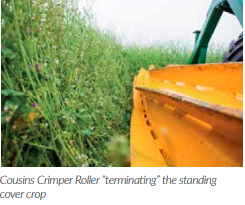The third annual Groundswell No-Till Show and Conference took place at Lannock Manor Farm on 27th and 28th June at Lannock Manor Farm attended by over 1,200 farmers, landowners and other delegates with a shared interest in soil health. The theme of the conference was health, the idea being that health is fundamental for soil, plants and the humans and animals that survive off the plants. The additional health argument lies in a healthy balance sheet and the take home message from Groundswell this year was the sense of achievability of this through a more conservation – minded approach to agriculture.
It was difficult to decide what to see at Groundswell with over 70 different sessions taking place with discussions ranging from no-till practicalities to small robots. The keynote speakers who had flown in from all corners of the world brought with them fresh ideas and ways of thinking that sometimes are hard to fathom for traditional UK farmers. Highlights included Dan Kittredge (Bionutrient Food Association, USA) questioning the assumptions when it comes to nutritional density of food. Packing out the Seminar Barns was Greg Judy (Green Pasture Farm, USA) who engaged both pasture and arable farmers. It was an inspiration to hear how mob grazing has transformed his farms soils and bottom line.
Ademir Calegari from Brazil was an entertaining and informative speaker, somewhat a Latin American no-till legend and a fountain of knowledge. The key message UK farmers took home was just how much improvement in soil quality can be made after a few decades of direct drilling and cover cropping. Ademir acknowledged that the climate differences between South America and Europe are indeed tangible but the principles of soil health are universal.
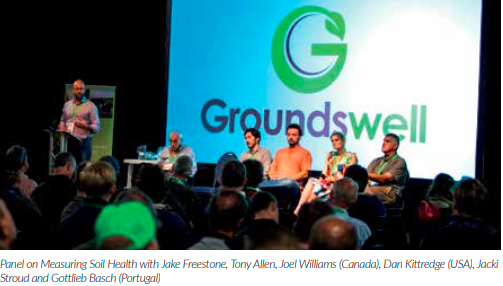
Joel Williams gave a talk each day of Groundswell covering Diversity and Carbon and Advanced Plant Nutrition which had the Conference Barn hanging on his every word. Delegates also had the opportunity of hearing Joel on the panel discussions on Measuring Soil Health which concluded, as we all know, that we are quite far from agreeing on a standard test to quantify this metric. The results of the much-anticipated No-Till Benchmarking Group, the first of it’s kind in Europe were released to a packed-out Conference Barn by Gary Markham of Land Family Business. The independent group of 12 no-till farms revealed an average £10/t saving on wheat production and machinery costs averaging at £31/t, compared to £54/t with other establishment systems. Delegates also heard from Jake Freestone of Overbury Enterprises who claimed his establishment costs have fallen to just £52/ha on their 1,200ha Worcestershire estate.
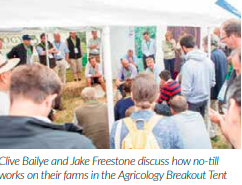
Extreme conditions in the demonstration field really tested the 13 Direct Drill Manufacturers who illustrated the establishment, either by tine or disc into a waist high multispecies cover crop. Some crimper rollers attached onto the front provided a forward-thinking approach to helping terminate the crops and this is certainly an area for more investigation. Amongst other highlights in the field; Cranfield University showcased their rainfall simulator showing a constant rainfall event on different soil conditions and how the water percolation and soil organic matter run-off is affected. In the AHDB Soil Pit Elizabeth Stockdale was keen to explain to farmers how significant it was that a root from the cover crop had followed a worm hole nearly 2m deep to find moisture and even in the drought conditions there were visible water drops forming at the bottom.
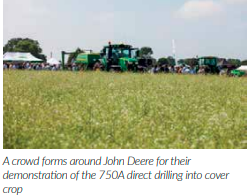
There were a significant number of campers at Groundswell this year and the weather was definitely on their side. As the sun started to set on the Wednesday evening, “The Earthworm Arms” Bar was packed out with thirsty minds sharing ideas over a pint or two of local ale and a grass-fed Argentinian asado. Adam Horovitz’s words from his book “The Soil Never Sleeps” could not have been more appropriate!
Groundswell Host Farmer writes..
It was good to see so many of you at Groundswell at the end of June. Like the best parties, the whole thing passed in a bit of a blur, leaving memories of snippets of talks and conversations and demonstrations, as well as regrets for all the things I missed. I was worried that the ground would be a bit hard for the drills to make much impression on, but they all, in their own ways, scratched through the surface and planted their seed and each drill was followed by a mob of eager farmers looking for all the world like a flock of seagulls, studying their performance. I’ll leave it to others to rate which was considered the most successful… Of course, planting the seed is vital, but by no means the most important aspect of making no-till work on your farm.
Keeping on top of weeds and disease, getting fertility right, planning what crops to grow and nurturing the soil are all crucial as well. All these subjects were covered in the various talks throughout the two days. For those who weren’t there, as well as those who were but couldn’t be in two places at once, we’ve now uploaded most of the talks from the two main halls onto our YouTube channel (type in Groundswell Agriculture on YouTube to find them). There’s a lot of fascinating ideas and hard won knowledge in there.
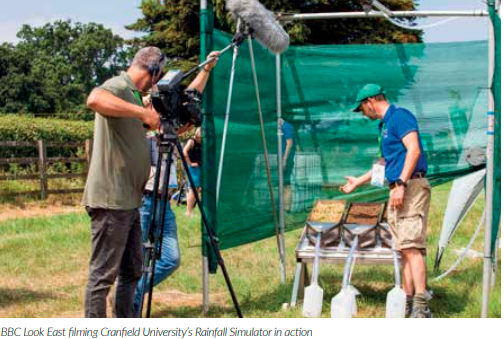
One thing we’ve struggled to find on the farm here, is anything resembling a coherent rotation to adopt. Talking to other farmers, it seems we’re not the only ones. Diversity of cropping is one of the cornerstones of Conservation Agriculture, but decent paying break crops are hard to find, peas and beans have been disappointing to say the least (although we tend to get a cracking wheat crop after them), rape is a nightmare with flea beetle, pigeons and constant expense from the moment you drill it until it leaves the farm and the various alternatives leave a lot to be desired.
So we’ll be focussing on rotation, rotation, rotation next year, as well as companion cropping (aka getting all the diversity in at one go). Having ruminant animals on the farm gives us opportunities to grow summer covers for grazing, but not everyone has this option. We had the idea of having some form of speed-dating arrangement to pair arable farmers with graziers looking for out of season land to feast on. If anyone has an idea of how we can make this work, please get in touch. We are also planning on moving the demonstrations to another field on the same side of the road as the lecture barns, as we reckon it’s about time we took a crop off the demo field before club root or some similar horror infects it. It’ll also reduce the risk of losing delegates to a road traffic accident…
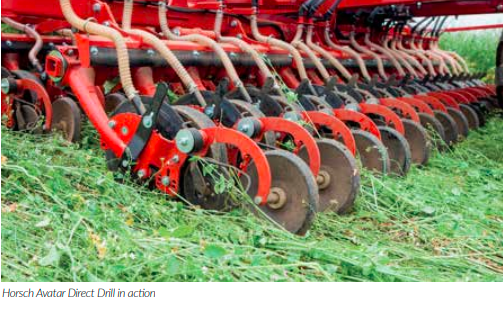
This is a show for farmers, by farmers, as we keep emphasising. So if any of you have thoughts or suggestions of what you would like to see covered next year, please get in touch. We know no-till works and we know it can work much better… there is not much enthusiasm from the mainstream advisory bodies for doing this, so it’s up to all of us farmers to share our experiences and ideas to make it successful.
With this in mind, there will be more focus on adapting the lessons that our colleagues in the Americas and the Antipodes have learned, to European conditions. We’re hoping to book more local speakers, remembering that local post-Brexit, still means European… We’ve been quietly pleased with this years harvest, although everything suffered with the dry weather, nothing was a complete write-off and the barns are full enough and our costs this year have been very low, which means more money in the bank to add to more carbon in the soil. Life just gets better and better! John Cherry john@groundswellag.com
